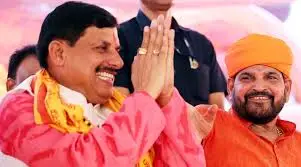MP’s nine-month celebration of an 18th-century queen: The importance of Ahilyabai Holkar

Who Was Ahilyabai Holkar?
Ahilyabai Holkar (1725–1795) was the queen of the Malwa kingdom in the Maratha Empire, ruling from 1767 until her death. She ascended the throne after the death of her husband, Malhar Rao Holkar, and her son, and took on the immense responsibility of governing one of the most prosperous regions in central India.
Ahilyabai’s reign was marked by exceptional administrative skills, deep compassion, and a commitment to social welfare. At a time when female rulers were rare, she emerged as a formidable leader, earning respect not just in her kingdom but across India.
Why Celebrate for Nine Months?
The decision to celebrate Ahilyabai’s legacy for nine months is symbolic and deliberate. It reflects the depth and breadth of her contributions that still resonate centuries later. The celebration, initiated by the Madhya Pradesh government, involves cultural programs, exhibitions, seminars, and community events aimed at educating the public—especially younger generations—about her extraordinary life and achievements.
This extensive celebration period also allows different districts and communities within Madhya Pradesh to participate, bringing local pride and a collective recognition of Ahilyabai’s significance to the region’s identity.
Ahilyabai Holkar’s Contributions
1. Administrative Excellence:
Ahilyabai Holkar was an astute administrator who ensured justice and welfare for all her subjects. She is known for her fair tax policies and efforts to curb corruption. Her governance was inclusive, supporting the rights of women, farmers, and marginalized communities.
2. Infrastructure Development:
One of her most notable legacies is the extensive development of infrastructure. Ahilyabai built hundreds of temples, wells, dharamshalas (rest houses), and roads throughout her kingdom and beyond, promoting pilgrimage and trade. Cities like Maheshwar, her capital, flourished under her reign and became centers of art, culture, and spirituality.
3. Patron of Culture and Religion:
Ahilyabai was a devout Hindu who respected all religions. She is credited with restoring and maintaining many important Hindu temples across India, including the Kashi Vishwanath Temple in Varanasi and the Somnath Temple in Gujarat. Her patronage encouraged cultural activities, and she promoted classical arts and crafts, especially the weaving traditions of Maheshwar.
4. Social Reforms:
Ahilyabai was a pioneer in women’s empowerment. She led by example, showing that women could rule justly and effectively. She provided education and healthcare support and ensured that widows and the poor were cared for. Her reign was marked by compassion and efforts to uplift the downtrodden.
Importance of Ahilyabai Holkar in Today’s Context
Ahilyabai’s legacy is more relevant than ever today. In a time when India continues to strive for social justice, gender equality, and inclusive growth, her life serves as an inspiring model.
- Women Leadership: Ahilyabai’s rule is a powerful reminder of women’s capability to lead and govern effectively. Her story encourages breaking gender stereotypes and empowering women in leadership roles across all sectors.
- Good Governance: Her administration’s emphasis on justice, transparency, and welfare resonates with the principles needed in modern governance.
- Cultural Preservation: By celebrating her contributions to culture and religion, Madhya Pradesh underlines the importance of preserving India’s rich heritage while embracing progress.
The Celebration’s Activities and Impact
The nine-month celebration is not only a historical commemoration but also a living dialogue connecting past values to present aspirations. Events are organized across the state including:
- Cultural Performances: Folk music, dance, and theater plays depicting Ahilyabai’s life and times.
- Exhibitions: Displaying artifacts, manuscripts, and visuals related to her reign.
- Educational Programs: Workshops and seminars for students and teachers on history, governance, and women’s empowerment.
- Community Development Drives: Inspired by her social welfare initiatives, activities focused on rural development, health camps, and women’s skill training.
This celebration fosters a collective pride and deeper understanding of Madhya Pradesh’s historical identity and encourages citizens to imbibe Ahilyabai’s values of service, humility, and dedication.
Conclusion
Ahilyabai Holkar remains a towering figure in Indian history—a queen who balanced power with compassion and devotion. Madhya Pradesh’s nine-month-long celebration of her legacy is not only a tribute to a great ruler but a reaffirmation of values that continue to inspire generations.
Her life story teaches us that leadership is not just about authority but about responsibility towards the welfare of all people. As the state honors Ahilyabai Holkar, it also ignites a renewed spirit of pride, cultural preservation, and inclusive progress for the future.






